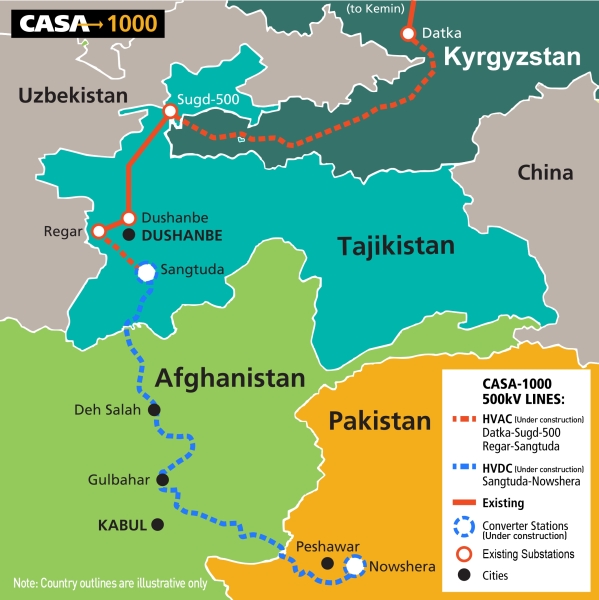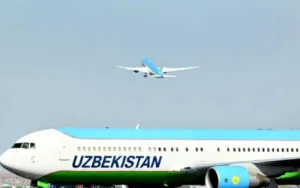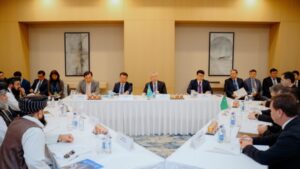The annual summit of the Shanghai Cooperation Organization (SCO), held in Astana, did not only make the news because the organization encompasses some of the countries with the largest population and GDP. The summit included some discussions that have the potential to reshape the Eurasian economy in several aspects and one of these aspects includes the energy sector. More specifically, as part of the summit, Chairman of the Peoples’ Council of Turkmenistan, Gurbanguly Berdymmukhamedov, repeatedly stressed the need for energy cooperation with Afghanistan, stating that Turkmenistan is fulfilling all its obligations towards the organization and could see its role as guarantor of energy security expand as part of that. While this rhetoric has been usually connected with the Turkmenistan Afghanistan Pakistan India (TAPI) pipeline, this time the discussion shifted more towards broader energy projects that can benefit Afghanistan. Asghabat has been eagerly looking to expand its exports and find new markets and Afghanistan, which attempts to rebuild its economy and society, can emerge as a great opportunity. However, the main question is how much can be done, from a geoeconomic perspective, through this bilateral partnership.

Why pursue new export markets?
As mentioned, Turkmenistan has, over the past years, been looking to assume the role of the energy security guarantor in Central Asia and beyond, harnessing its position as a country with one of the world’s largest gas reserves. Its attempts to connect itself to markets such as the EU have been met with little success so far, predominantly due to the lack of access to financial resources, but also the unfavorable geopolitical environment in the South Caucasus and Iran. On the southern front, TAPI pipeline has also faced similar hurdles, resulting in a situation whereby Turkmenistan has virtually exclusive relations with China in matters of gas trade.
Turkmenistan – Afghanistan Dynamics
The southern border of the country, nonetheless, is a gate to a country that has the potential to become a good export market. More specifically, Afghanistan is in a position, where it can become a demand-hungry market, under the right conditions. The two countries have been engaging in trade with volumes that have increased from $40mn in 2011 to almost $500mn in 2023, at an annual increase rate of close to 30%. The main trade products have been petroleum-related ones from Asghabat’s side, while from Kabul’s side agricultural products dominate the excessively small level of exports to Turkmenistan. These figures still make Afghanistan a small-scale partner of Turkmenistan and provide ample room for expansion. Currently, the South Asian state of more than 40mn inhabitants is isolated by many countries from the global community because of the Taliban regime takeover that took place and this has reflected into the economy, apart from the society. From an economic perspective, this translates into a stagnant economy that, combined with a demographic growth, results in galloping unemployment and social unrest. In similar occasions, investments in infrastructure have proven to be a good driver of development and create a reinforcing macroeconomic loop that leads to development. Turkmenistan can provide this, through a bilateral partnership, via two means.

Electricity Diplomacy
The first one includes Turkmenistan’s electricity diplomacy. Ashgabat is building electricity capacity so that it can expand its exports, with the examples of the 1,574MW steam-gas power plant in Mary-Ahal and a combined-cycle power station in the Balkan region that is under construction proving the rule. The two countries already have relations in the interconnections front, including the 220kV line between Yolotan, Turkmenistan and Serhatabat, Afghanistan, nonetheless an expansion of their connection should take place. TAP and CASA-1000 are two ambitious projects that can provide that added capacity. There are two key issues related to that. The first one is of financial nature. The expanded capacity of Turkmenistan is currently taking place in its Western part, hence interconnection is expected to be costlier. The second one is that interconnection relies upon projects that are expected to be implemented by partners that do not yet recognize the Taliban regime. CASA-1000 is a project developed by ADB and the World Bank, whereas TAP is a project where ADB is also a contributor. Both multilateral financing institutes include partners that do not support the existing regime in Kabul, hence objections might be made about the resumption of works in both projects. Finally, electricity has limited use in a country’s economy, as it cannot provide full-scale support towards the heavy industry, which can support the infrastructure sector and essentially spur development in the country.
Gas Diplomacy
Another solution would include direct gas trade between Afghanistan and Turkmenistan and development of infrastructure, both for the industry and for electricity production, within Afghanistan. This is a project that, if accompanied by a thorough industrial policy within Kabul, can catalyze development in the country. It is a largely ambitious project, as it will require figures among the tens of billions to finalize transportation infrastructure, build power plants and other types of infrastructure related to the heavy industry. At the same time, however, it is not bound by any multilateral bank. This means that it can become an SCO-fueled project, with China leading the effort. It has the potential to become the first financing project of the aforementioned regional bloc and become the starting point for intensified collaboration beyond the levels of security, essentially converting itself into a larger, stronger and more coordinated and focused version of CAREC. Reflecting on that, the next question to be answered must be what is the current status of acceptance of the Taliban regime by SCO members, what their views are and how coordinated action can take place, which requires painstaking analysis to provide a comprehensive response.
Overall, the introduction of Belarus into the SCO has been among the highlights of the SCO Astana summit, however the discussions that were held on the energy front have the potential to be much more impactful for Central Asia and Afghanistan. The dialogue between Turkmenistan and Afghanistan and the opening towards bilateral and Afghanistan-centric projects has the potential to lead to a strategy that can pull Kabul out of the pit of economic stagnation. Nevertheless, matters of political recognition still exist, apart from the financial aspect, which can inhibit SCO from reaching its full potential in terms of promoting development in all its economies.
Written by: Dimitris Symeonidis
Dimitris Symeonidis is a Central Asia-focused energy geoeconomics and geopolitics expert. He founded the Decentralized Solutions Global Network (DSGN) for energy and agrifood systems and leads Greece’s first green hydrogen project in Crete. Additionally, he advises at URANO Kapital, serves as policy lead at YES-Europe, and is an OSCE expert. Dimitris is also an EU Climate Pact and Young Energy Ambassador.




